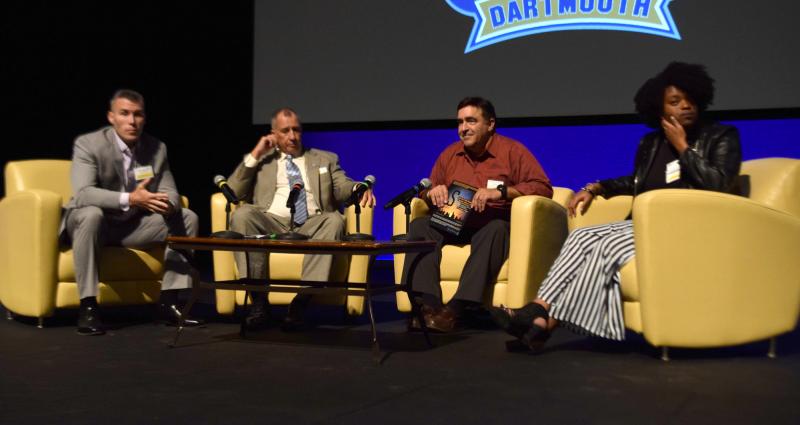University summit focuses on ending the stigma of addiction
When Jessika Dunn began her clinical work at a South Coast hospital’s maternity ward, she immediately noticed a trend that shocked her – 85 percent sick newborns showed signs of prenatal drug exposure.
The University of Massachusetts Dartmouth nursing student was one of about 460 students and professionals taking part in a day-long substance abuse summit held at the campus on September 28. With a theme of “Help, Hope, and Recovery,” one of the messages that resonated the most with Dunn was her role in fighting the stigma of drug addiction.
“It’s important that we all need to play an active role in helping people see this as an illness,” Dunn said during a lunch break after a morning of lectures.
Nursing professor Kathleen Elliott worked to bring the summit to Dartmouth after attending a similar event at Bridgewater State University. It was organized by the CONNECT Partnership, made up of a group of southeastern Massachusetts and Cape Cod colleges and universities. She reached out to Stacy Kaminski from the partnership, who organized one for the university campus.
The panels included guest speakers such as Bristol County District Attorney Tom Quinn, Hawthorn Medical cardiologist and Physicians to Prevent Opioid Abuse organizer Michael Rocha, law enforcement experts, and recovering addicts. Multiple workshops and panel discussions were held to discuss substance misuse, harm reduction and prevention, and how to engage college students in drug abuse awareness.
Elliott noted that the diversity of the speakers helped attract a broader audience and increase awareness across disciplines.
“I don’t think we’ve had anything at UMass Dartmouth that’s been multidisciplinary,” Elloitt said. “I think that’s why this really took off. The diverse committee and presenters really helped get others involved.”
Although most attendees were nursing students from member colleges and universities, there was also sizable representation from criminal justice, psychology, and sociology majors, Kaminski noted.
Those attending took with them some surprising facts from the day of lectures and questions-and-answers sessions. Taylor Seay said she was shocked to learn that in some cases, kids as young as eight years old began experimenting with drugs, which began lifelong battles with addiction.
“Education is a big part of this; we have to educate people on getting help and steering away from drugs,” Seay said.
The entire summit was also livestreamed to each campus in the CONNECT Partnership for students who were not able to make it to the university.











